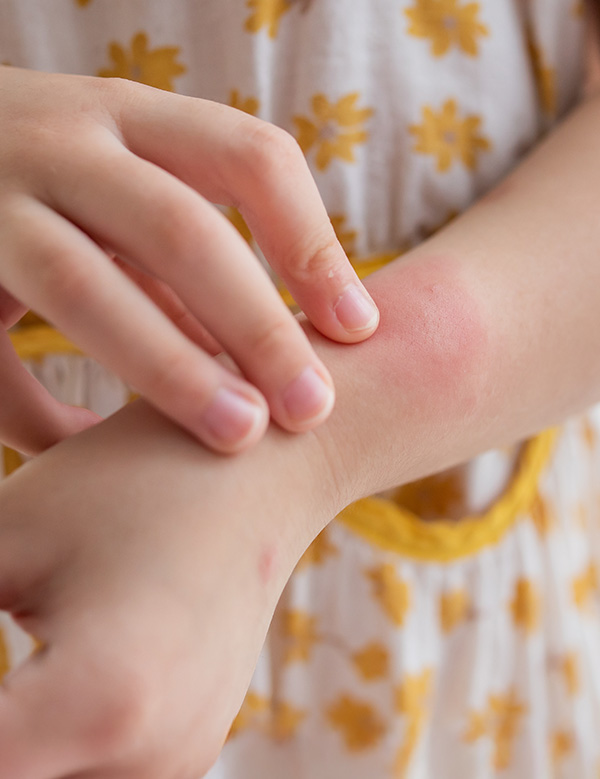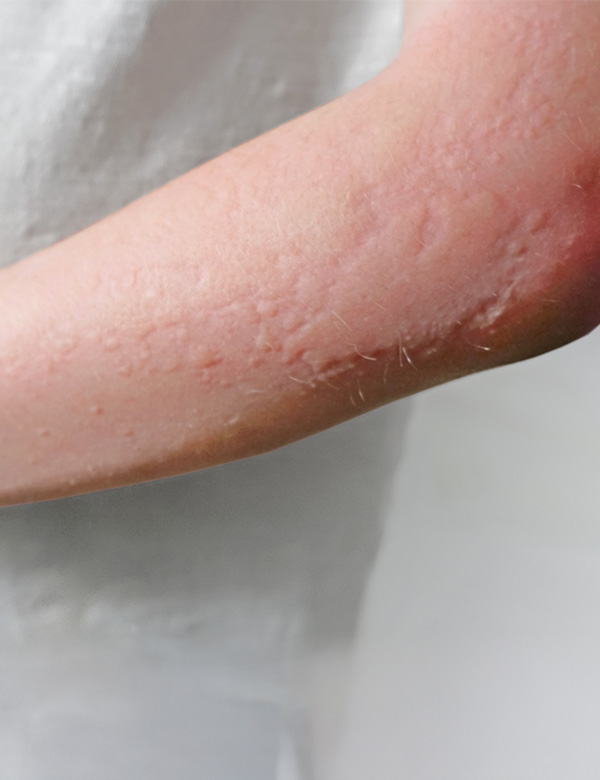Food Allergies
Food allergy or food intolerance in children and adults – diagnosis by an experienced dermatologist and allergy specialist at Derma Medical Clinic in Zurich – Sihlcity
Food Allergies
Chronische Abszesse und schmerzhafte Knoten durch erfahrenen Hautarzt abklären und behandeln in der Derma Medical Clinic in Zürich - Sihlcity
Skin rash, itching or digestive problems after eating – we diagnose potential food allergies or food intolerances using allergy testing, nutritional counselling, and treatments to relieve symptoms
Tests
Allergy test
Blood test
if needed: ruling out other skin or digestive conditions
Process
Initial consultation + testing
Duration
30 minutes
This test is especially recommended if you…
- frequently experience itching, skin rashes or hives after eating certain foods
- regularly have digestive issues like bloating, stomach pain or diarrhoea after eating
- notice skin reactions or discomfort in children after eating specific foods
- suspect that certain foods are causing your symptoms, but are unsure which ones
- are looking for a clear diagnosis and practical recommendations – for example, on eating habits, shopping or eating out

Who should get tested for food allergies or intolerances?
This test is especially recommended if you…
- frequently experience itching, skin rashes or hives after eating certain foods
- regularly have digestive issues like bloating, stomach pain or diarrhoea after eating
- notice skin reactions or discomfort in children after eating specific foods
- suspect that certain foods are causing your symptoms, but are unsure which ones
- are looking for a clear diagnosis and practical recommendations – for example, on eating habits, shopping or eating out
Treatment
What’s the difference between food allergy and food intolerance?
Not every reaction to food is a true allergy. Sometimes it’s an intolerance – the causes and symptoms can be very different.
Food allergy
A true food allergy is when the immune system reacts overly sensitively to certain proteins in foods – such as peanuts, cow’s milk, eggs, or fish. Even small amounts can cause a reaction. Symptoms usually appear within minutes and can vary in intensity:
- skin rash, hives, or itching
- swelling (e.g., lips, tongue, or eyelids)
- shortness of breath, cough
- nausea, stomach pain, or vomiting
- in severe cases: allergic shock (anaphylaxis) – a medical emergency
Food intolerance
In a food intolerance, the immune system is not involved. The body can’t properly break down certain substances – the digestion is overly sensitive to certain components. Symptoms usually occur hours after eating and are often less clear. Common signs include:
- bloating, stomach pain, diarrhoea
- skin reactions like eczema or itching
- general discomfort, headaches, or fatigue
Common intolerances include:
- Lactose intolerance – trouble digesting milk sugar
- Fructose intolerance – difficulty absorbing fruit sugar
- Histamine intolerance – reactions to foods high in histamine, like aged cheese, red wine or tuna
- Gluten sensitivity – reactions to gluten-containing foods without having coeliac disease
What happens during testing?
At Derma Medical Clinic, we perform a detailed allergy evaluation:
- We begin by discussing your symptoms and your diet
- Then we test for common food allergens – for example, using a prick test or a blood test (In the prick test, small drops of allergen solutions are placed on your skin, and the surface is gently scratched)
- Depending on the results, we may suggest further testing to check for intolerances or rule out skin conditions
What happens after the diagnosis?
If we confirm that certain foods are causing your symptoms, we discuss the next steps together:
- You’ll receive clear advice on which foods to avoid, like milk, nuts or eggs
- If you have skin reactions or itching, we can prescribe relief medication
- We provide practical dietary tips – also helpful for children’s nutrition
- If you have a severe allergy, we’ll explain what to do in an emergency – and provide an emergency kit with an adrenaline pen if needed
What’s the procedure for evaluating food allergies and intolerances?
Initial consultation
We take time to understand your symptoms – or your child’s – in detail. Previous reactions and known allergies are also considered.
Allergy testing and diagnosis
Depending on your symptoms, we carry out a skin allergy test or draw blood to check for reactions to specific foods.
Results & dietary guidance
Once the cause is identified, we talk through what this means for your daily life.
Follow-up care (if needed)
If you have rashes or lasting itching, you’ll get treatment to ease symptoms. If your allergy is severe, we’ll explain what to do in an emergency.

At Derma Medical Clinic, allergy care is provided by Dr. Markus Dendorfer, a board-certified dermatologist and allergy specialist.
He has many years of experience in the diagnosis and treatment of allergic conditions, from hay fever to complex allergic reactions.

Dr. med. Markus Dendorfer
Board-certified Specialist in Dermatology & Venereology FMH
What to expect at our clinic
Identifying allergies
Even when an allergy isn’t obvious at first: we combine dermatology expertise with modern allergy testing – especially for skin reactions where the cause isn’t clear.
Child-friendly testing & support
With children, we work gently, explain things in age-appropriate ways, and support families with clarity and empathy.
Knowing what works for you
We don’t just focus on what to avoid – we also show you what you can eat instead, with confidence, balance and enjoyment.
Everything in one place:
You’ll receive diagnosis, medical treatment and cosmetic care all in one place. That means familiar contacts, short distances and coordinated support – from the first visit through to aftercare.
Do you often get skin rashes, itching or digestive problems after eating—but don’t know why?
Book an appointment now for a thorough evaluation at Derma Medical Clinic in Zurich - Sihlcity.
FAQ – Common Questions about Food Allergy & Intolerance:
What’s the difference between food allergy and intolerance?
In a food allergy, the immune system reacts to proteins—usually right after eating. A food intolerance doesn’t involve the immune system. Symptoms appear later, for example due to an enzyme deficiency (like lactose intolerance) or irritants like histamine.
What skin reactions can food cause?
Typical symptoms:
- sudden hives (urticaria)
- itching, redness or rashes
- swollen lips, eyes or face
- eczema, especially if you have neurodermatitis
These symptoms usually appear within minutes to a few hours of eating.
How is a food allergy diagnosed?
Several allergy tests can be done by a dermatologist:
- Prick test on the skin
- Blood test to detect allergy-related antibodies
- if needed: ruling out other causes (e.g., contact allergy or skin condition)
Tests are chosen based on your symptoms and medical history.
What does a dermatologist do for food allergies?
Many food allergies show up on the skin—for example, as itching, redness or facial rashes. A dermatologist can examine these reactions, confirm or rule out allergies, and suggest suitable treatment.
What can I do about skin rashes after eating?
If you often notice skin issues after eating, get tested. Depending on the result, helpful steps include:
- avoiding certain foods
- taking medication to relieve symptoms (like antihistamines)
- in severe cases: having an emergency kit with an adrenaline pen
Which foods often cause allergies?
Common triggers include:
- Nuts (e.g., hazelnuts, peanuts)
- Milk, eggs, soy
- Fish, seafood
- Wheat, celery
- Certain raw fruits or vegetables like apples, carrots or tomatoes
Triggers may vary by age, region and lifestyle.
How can I prevent allergic reactions?
- avoid known triggers (after reliable diagnosis)
- always check ingredient lists
- if you have a severe allergy: carry emergency medication
- if suitable: consider desensitisation therapy
What’s the difference between immediate and delayed reactions?
- Immediate reactions occur within minutes of eating (e.g., rash, shortness of breath)
- Delayed reactions take hours or days to develop (e.g., eczema, digestive issues)
Both types can be identified through allergy testing by a dermatologist.
Are children also affected by food allergies?
Yes – food allergies in children are common. Many kids react to milk, eggs or nuts during early childhood. In many cases, these sensitivities lessen over time. Regular check-ups help avoid unnecessary diets.




